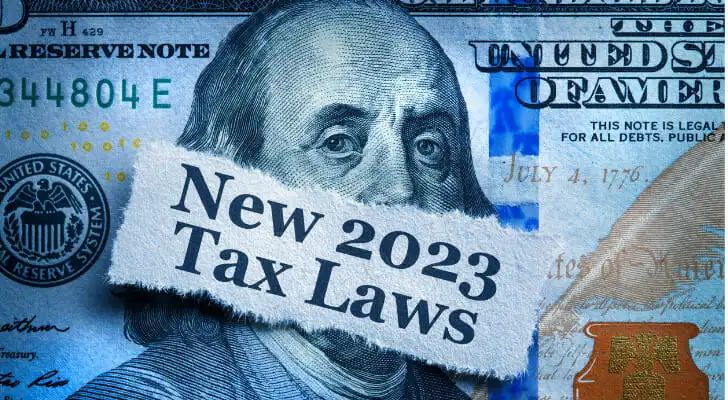In October 2025, the IRS released updated standard deduction amounts and tax brackets for the 2026 tax year. These revisions account for inflation and help keep rising prices and wages from pushing taxpayers into higher marginal rates without an actual increase in real income. Without regular adjustments, tax thresholds established years ago would apply to far larger dollar amounts today. Annual updates allow the tax code to reflect present-day economic conditions rather than outdated income levels.
For more info on how these changes will affect your personal tax bill, consider matching with a financial advisor.
What Is The New Standard Deduction For 2026?
The new standard deductions for personal income taxes apply as follows:
- Individuals: $16,100, an increase of $350 from 2025.
- Head of Household: $24,150, an increase of $525.
- Married Filing Jointly: $32,200, an increase of $700.
What Are the New Tax Brackets For 2026?
The new tax brackets for personal income taxes apply as follows:
2026 Federal Income Tax Brackets
| Rate | Single | Married, Filing Jointly | Married, Filing Separately | Head of Household |
|---|---|---|---|---|
| 10% | $0 – $12,400 | $0 – $24,800 | $0 – $12,400 | $0 – $17,700 |
| 12% | $12,400 – $50,400 | $24,800 – $100,800 | $12,400 – $50,400 | $17,700 – $67,450 |
| 22% | $50,400 – $105,700 | $100,800 – $211,400 | $50,400 – $105,700 | $67,450 – $105,700 |
| 24% | $105,700 – $201,775 | $211,400 – $403,550 | $105,700 – $201,775 | $105,700 – $201,750 |
| 32% | $201,775 – $256,225 | $403,550 – $512,450 | $201,775 – $256,225 | $201,750 – $256,200 |
| 35% | $256,225 – $640,600 | $512,450 – $768,700 | $256,225 – $384,350 | $256,200 – $640,600 |
| 37% | $609,351+ | $768,700+ | $384,350+ | $640,600+ |
Long-term capital gains tax rates have also been adjusted. These tax rates apply to capital gains realized on assets that are sold after at least one year.
2026 Capital Gains Tax Rates
| Tax Rate | Individuals | Married Filing Jointly | Head of Household | Married Filing Separately |
|---|---|---|---|---|
| 0% | $0 – $49,450 | $0 – $98,900 | $0 – $66,200 | $0 – $49,450 |
| 15% | $49,450 – $545,500 | $98,900 – $613,700 | $66,200 – $579,600 | $49,450 – $306,850 |
| 20% | $545,500+ | $613,700+ | $579,600+ | $306,850+ |
What Is the Impact of the New Brackets?

Any upward adjustment to the standard deduction or tax brackets is an effective income tax cut. It means that taxes apply to less of your income and that you pay less on the income that is taxed.
The question is whether any given taxpayer ends up with more spending power. The IRS doesn’t adjust its rates to give people tax relief, but rather to reflect the new value of money based on inflation/deflation cycles. If prices have gone up by 10%, but you keep 7% more from your taxes, then as a consumer you’re still effectively a little bit less wealthy than when you started.
What makes this more confusing is the degree to which sector-specific and region-specific inflation have muddled the economic picture as, contrary to general reporting, prices have stabilized in many areas but are skyrocketing in a few others. The result is that some taxpayers will, in fact, end up wealthier from these rate changes based on their spending patterns.
Who Does This Tax Change Apply To?
This applies to all U.S. income taxpayers. If you file and pay income taxes to the IRS in 2026, you will do so using the new brackets.
What Income Does This Affect?
The new tax brackets will apply to all earnings starting on Jan. 1, 2026. It does not apply retroactively, meaning that you can’t apply the new standard deduction or tax rates to income on or before Dec. 31, 2025.
Can I Apply This to Current Earnings?
As above, you cannot apply the new tax brackets to any income that you earned on or before Dec. 31, 2025. In IRS-speak, this means that if you triggered a tax event in 2025 the 2025 tax brackets apply, not the new ones.
But you might apply the new tax brackets if you can defer earnings until 2026. The key is in the term “tax event.” This is a technical term for the IRS which means any event that causes you to owe taxes on income, earnings or other wealth. It means different things under different circumstances, but for individuals a tax event usually occurs when you take possession of new wealth.
It’s important to note that businesses can use two different methods of bookkeeping. One considers it a tax event when you are owed money. The other considers it a tax event when you collect that money. Make sure you understand which method you use and apply it consistently.
The common theme is that, in most cases, you trigger a tax event when the new wealth is received, not when it’s owed. In other words, you pay 2025 tax rates on all money that you collected in 2025. You will pay 2026 tax rates on all money that you collect in 2026.
Self-employed individuals may be able to hold off on invoicing clients until the new year, collecting under the new brackets rather than the old. Selling investments assets is a little more complicated, since price changes may obviate any tax gains, but the same rules would apply to selling in one year versus another.
It’s important to note that all of this is theoretical and absolutely should not be taken as individual tax planning advice. The rules for your personal situation may vary, as tax laws are highly situation-specific and can depend on your employer’s method of bookkeeping. Consult an accountant or financial advisor before making any plans.
Do I Have To Do Anything?
No. While outsized, this is a standard change. It does not affect your rights or responsibilities differently than any other tax year. You will pay your taxes as normal, simply applying the new numbers as appropriate.
Bottom Line
The IRS has announced its new tax brackets for 2026, and they’re a considerable change over previous years. It’s important to understand how these brackets work and what you could end up paying, based on your unique situation. You may need to work with a financial advisor or tax professional to help you properly plan for your own tax liability.
Tips for Taxpayers
- Tax brackets might be the most misunderstood part of all tax law. Just because you’re in the 22% bracket does not mean you pay 22% of your income to the IRS. Here’s why.
- Tax planning can be complicated, and you absolutely shouldn’t go it alone. Instead, you can find a financial advisor to help you with your entire tax planning process. Finding a financial advisor doesn’t have to be hard. SmartAsset’s matching tool matches you with vetted financial advisors who serve your area, and you can have a free introductory call with your advisor matches to decide which one you feel is right for you. If you’re ready to find an advisor who can help you achieve your financial goals, get started now.
Photo credit: ©iStock/DNY59, ©iStock/syahrir maulana
